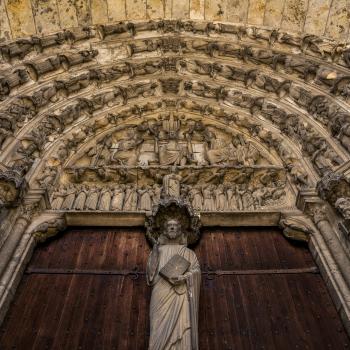Each year, the season of Advent commences on the fourth Sunday before December 25. Unlike the Gregorian Calendar (the calendar most of the world observes), the Church year or liturgical year begins not on January 1 but on Advent Sunday. It is no accident that the Christian year begins with Advent. This season frames how we ought to view God, ourselves, and the entire arc of human history…. not a bad reminder for the start of each new year.
The season of Advent derives its name from the Latin adventus meaning “a coming, approach, or arrival.” Because Advent ushers in Christmastide (beginning on Christmas eve and extending over 12 days), I think our tendency is to think Advent primarily refers to Jesus’ incarnation. However, if we focus exclusively on the birth of Jesus during Advent, we’re being a bit shortsighted.
In the New Testament, adventus (or the Greek equivalent parousia) most often refers to Jesus’ second coming at the end of the age (e.g., Matt 24:27, 37, 39; 1Cor 15:23; Jas 5:7; 2Pet 3:12; 1John 2:28) and never refers to the incarnation (except for maybe once in 2Pet 1:16, but I think this, too, refers to the second coming).
During Advent, Christians around this terrestrial ball celebrate the coming of God to man. The advent of God to man is a story that invades the fullness of time, encompassing our past, our present, and our future. As we observe the season of Advent, we are invited to recall anew the story of what God has done, what He is doing, and what He has promised to do.
There are three reasons why we need Advent each and every year. These three correspond to our past, present, and future.
1) WE NEED TO REMEMBER WHAT GOD DID: HE CAME
Thus far in human history, the climactic manifestation of God’s coming to man is the incarnation. We need Advent because we need to remember the incarnation every year, every week, every day, every moment.
Above all else, Advent is characterized by a sense of longing. The incarnation is the answer to the yearning of God’s people for God to come, to show up, to set things to rights. The incarnation is by no means the first time God had shown up in human history to dwell among his people. NT Wright observes that: “Judaism already had a massive ‘incarnational’ symbol, the Temple.” [1] Though in a sense God is everywhere present, He always seems to ordain a particular place to manifest His presence to dwell among His people (Exod 40:34-35; 2Chron 7:1). In the Old Testament, that place was the moveable Tabernacle and eventually became the Temple in Jerusalem.
This illuminates the full meaning of John 1:1, 14, the books ends of the greatest description of the incarnation: “In the beginning was the Word, and the Word was with God, and the Word was God…The Word became flesh and made his dwelling among us [literally ‘tabernacled among us’]. We have seen his glory, the glory of the One and Only, who came from the Father, full of grace and truth.”
About these verses NT Wright comments: “…the Incarnation of the eternal Word was the event for which the whole of creation had been waiting all along…” and despite this longing “…creation and even the people God were quite unready for this event.” [2]
2) WE NEED TO SEE WHAT GOD IS DOING: HE COMES EVEN NOW
During Advent we focus on the incarnation and Jesus’ second coming for good reason. And yet, if our focus is only on the past and future, we miss out on God is in our midst even now.
In Mere Christianity, C.S. Lewis explains that God comes now to make something miraculous of us through a parable of sorts. He writes:
Imagine yourself as a living house. God comes in to rebuild that house. At first, perhaps, you can understand what He is doing. He is getting the drains right and stopping the leaks in the roof and so on; you knew that those jobs needed doing and so you are not surprised. But presently He starts knocking the house about in a way that hurts abominably and does not seem to make any sense. What on earth is He up to? The explanation is that He is building quite a different house from the one you thought of – throwing out a new wing here, putting on an extra floor there, running up towers, making courtyards. You thought you were being made into a decent little cottage: but He is building a palace. He intends to come and live in it Himself. [3]
Advent reminds us of the long, sometimes painful, and always glorious process of God’s renovation project of our lives. God renovates our hearts and minds, giving us new desires and affections, in order that we might be bearers of His presence in our broken world. He renovates us in order that we might engage as workers in His cosmic renovation project of the world.
Advent calls us to remember that God comes to us and then to the world through us.
3) WE NEED TO YEARN FOR WHAT GOD WILL DO: HE WILL COME AGAIN
Perhaps the most poignant longing we ought to feel is the longing for Jesus to come back, to ultimately set things to rights. Even as the entire creation had been waiting for the incarnation, creation continues to groan, awaiting liberation from the bondage of decay when the Son of Man will come to fully establish His kingdom.
Advent reminds us of God’s promise and our hope: that Jesus will come again. When He comes, he will come in judgment and glory and the result of this advent shall be this:
The wolf will live with the lamb, the leopard will lie down with the goat, the calf and the lion and the yearling together; and a little child will lead them. The cow will feed with the bear, their young will lie down together, and the lion will eat straw like the ox. The infant will play near the hole of the cobra, and the young child put his hand into the viper’s nest. They will neither harm nor destroy on all my holy mountain, for the earth will be full of the knowledge of the LORD as the waters cover the sea (Isa 11:6-9).
It is, therefore, no surprise that the Scriptures end with a focus on Advent. Jesus’ final word to His Church in the Bible is the promise upon which we rest our hope: “Yes, I am coming soon” (Rev 22:20a). Our response to this great promise ought to be the great prayer of the Church: “Amen. Come, Lord Jesus” (Rev 22:20b).
ADVENT SERIES: WHAT’S IN STORE?
This post kicks off a series on Advent. Each Sunday in Advent I plan to showcase an Advent hymn. In the succeeding posts, you’ll be able to listen a few of my favorite versions of these Advent hymns and I’ll provide some brief reflections on the lyrics. The first hymn for the first Sunday of Advent will be Sufjan Stevens’ version of “O Come, O Come Emmanuel.”
Part 1 on the hymns of Advent can be read here: O Come, O Come Emmanuel.
Part 2 can be read here: A Hymn of Advent.
Part 3 can be read here: Savior of the Nations, Come.
Part 4 can be read here: Come, Thou Long Expected Jesus.
[1] N.T. Wright, Simply Jesus: A New Vision of Who He Was, What He Did, and Why He Matters
[2] N.T. Wright, What Is This Word? The incomprehensible, Intimate Christmas Story in Christianity Today (Dec 21, 2006).
[3] C.S. Lewis, Mere Christianity












